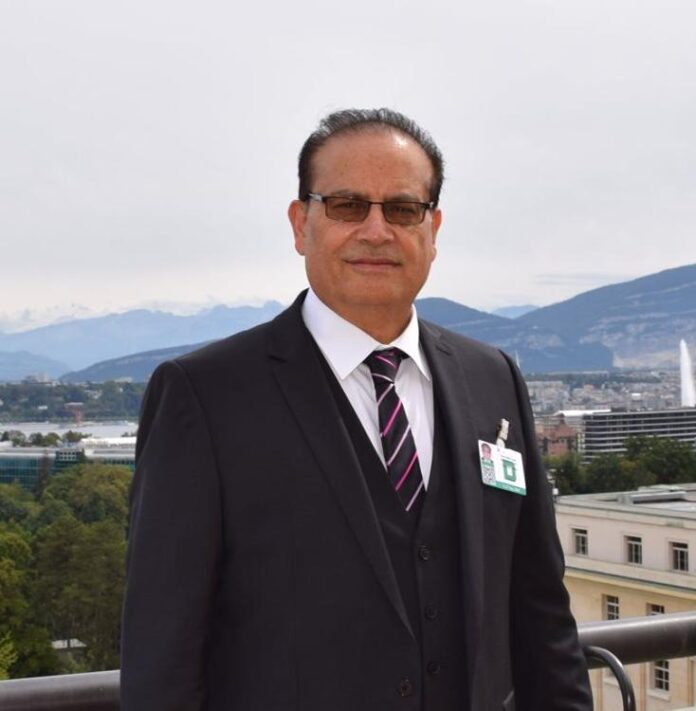Qamar Bashir
In a rare and groundbreaking public interview, Crown Prince Mohammed bin Salman of Saudi Arabia laid out a precise and systematic framework for implementing Islamic law in modern governance—one rooted unwaveringly in the Quran and guided selectively by verified Sunnah. In doing so, the Crown Prince has redefined the contours of Sharia interpretation at the highest levels of state, sending a bold message not just within the Kingdom, but across the Muslim world.
“As I said earlier, our constitution is the Quran—has been, still is, and will continue to be so forever,” he declared. This statement is not symbolic. It is a declaration of legal and ideological centrality that positions the Quran as the unshakeable foundation of Saudi Arabia’s governance, past, present, and future.
The Crown Prince reiterated that Saudi Arabia’s basic system of governance “stipulates this very clearly.” Whether it is the government, the Shura Council as the legislator, or the King as the reference point for the three branches of authority, they are “bound to implement the Quran in some form or another.” This obligation, he emphasized, is non-negotiable and systemic.
However, he also offered a nuanced differentiation within the domain of application: “In social and personal affairs, we are only obliged to implement stipulations that are clearly stated in the Quran.” He cautioned against overextending Sharia enforcement beyond what is explicitly ordained, stating, “I cannot enforce a Sharia punishment without a clear Quranic stipulation or an explicit stipulation from the Sunnah.”
Mohammed bin Salman delved into the methodology that should be used to interpret and apply Hadith, the sayings and traditions attributed to Prophet Muhammad (peace be upon him). He pointed out that while traditional compilations such as Bukhari and Muslim have categorized Hadith into “correct” and “weak,” this typology is not sufficient for governance. A more critical classification, he argued, lies in the chain of narration: whether a Hadith has been passed down by a collective chain (mutawatir) or by individuals (ahad or khabar).
“When we talk about a mutawatir Hadith—narrated and handed down from one group to another starting with the Prophet—these Hadiths are very few in number but they are strong in terms of veracity,” he explained. However, even these require context: “Their interpretations vary based on the time and place they were revealed and how the Hadith was understood at the time.”
In contrast, ahad Hadith—narrated from a single person to another in a non-collective chain—are not as authoritative. “This type of Hadith is not as compelling as the mutawatir Hadiths unless paired with clear Quranic stipulations and a clear worldly good to be had.” He noted that even when classified as “correct,” such Hadiths form a small and cautious part of legal reference.
He was most skeptical of khabar Hadiths—narrations passed through single individuals and with potential breaks or unknown sources in the chain. “This represents the majority of Hadith, and this type is unreliable whatsoever,” he said bluntly. “Its veracity is not established and it isn’t binding.”
Referencing the Prophet’s own recorded stance on Hadith, he remarked: “When the Hadith was first recorded, the Prophet (peace be upon him) ordered those records to be burnt and forbade the writing of Hadith.” This, he said, should apply even more rigorously to khabar Hadiths, so that people “are not obliged to implement them from a Sharia perspective.”
More importantly, he cautioned that unreliable Hadiths might be used “as ammunition to dispute God Almighty’s power to produce teachings that are fit for every time and place.” Therefore, the responsibility of any government that bases its legitimacy on Islamic law is to implement “Quran regulations and teachings in mutawatir Hadiths,” investigate the reliability of ahad Hadiths, and “disregard Hadiths entirely unless a clear benefit is derived from it for humanity.”
This legal precision carries serious implications. “There should be no punishment related to a religious matter except when there is a clear Quranic stipulation,” he said, and even then, “this penalty will be implemented based on the way that the Prophet (peace be upon him) applied it.”
He illustrated his point with the case of adultery. “The unmarried adulterer is flogged, the married adulterer is killed—this is a clear stipulation,” he said. But then he invoked the Prophet’s method, which was not rushed or punitive. “When the woman adulterer came to the Prophet and told him that she had committed adultery, he delayed judgment several times.” She had to return multiple times, even after confirming pregnancy and nursing, before the Prophet addressed her confession. “She could have not returned,” the Crown Prince noted, “but he did not ask about her name or who she was.”
The takeaway was profound. “To take a Quranic stipulation and implement it in a manner other than the manner followed by the Prophet, and look for the person to prove a certain charge against them… then that is not what God has ordained.”
He warned against abusing the label of Sharia to justify unsubstantiated punishments. “To implement a penalty on the pretext that it is a Sharia penalty, while there is no stipulation for such a penalty in the Quran or in the mutawatir Hadith, is a falsification of the Sharia.”
In his closing theological reflection, Mohammed bin Salman offered a reminder of divine mercy and human fallibility. “When God Almighty wanted us to punish a certain religious crime, He stipulated this clearly. And when He prohibited a deed and promised punishment in the Hereafter, He did not ask us as humans to penalize that deed.” Instead, he said, God left such matters to individual conscience, “knowing there would be a Day of Reckoning.”
“And in the end,” he concluded, “God is merciful, all-forgiving—except in the case of polytheism.”
This is not merely a religious statement. It is a legal doctrine. It is the architecture of a jurisprudence that insists on precision, on authenticity, and on the humanity of law. With his statements, Crown Prince Mohammed bin Salman has carved a new pathway—firmly rooted in the Quran, cautious of unauthenticated tradition, and conscious of God’s mercy and justice.
In an era where Islamic law is either politicized, romanticized, or misapplied, his vision stands out as both principled and practicable. It is now up to scholars, jurists, and statesmen across the Muslim world to consider: is this the future of Sharia? One rooted in Quranic clarity, prophetic mercy, and justice tempered with wisdom?
Only time will tell. But for now, the voice from Riyadh echoes with rare courage—and resounding clarity.
Qamar Bashir
Press Secretary to the President (Rtd)
Former Press Minister at Embassy of Pakistan to France
Former MD, SRBC
Macomb, Detroit, Michigan

















